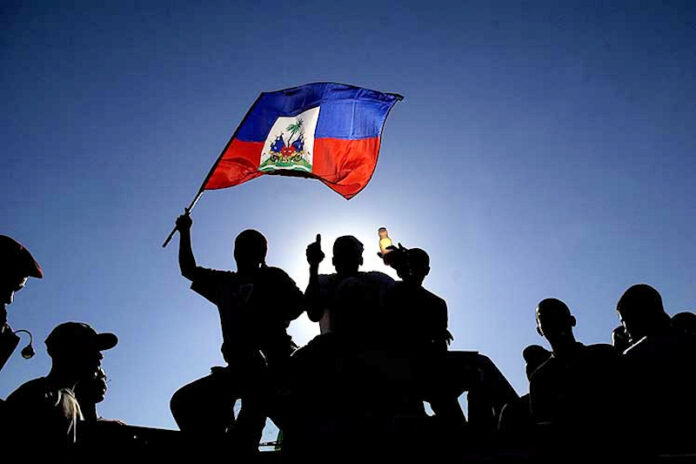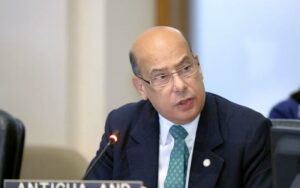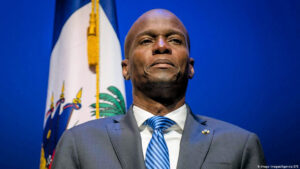
After nine-months of precarious political stability, protests in Haiti are intensifying as Feb. 7, 2021 approaches, the date on which President Jovenel Moïse must leave power, according to Haiti’s opposition groups.
But the opposition lacks unity. Two rival platforms held large mobilizations on Nov. 18 (the anniversary of the decisive 1803 battle of Haiti’s independence war) to demand the president’s resignation and denounce soaring insecurity and impunity. The marches, however, were repressed by the police.
The march, led by former senator Moïse Jean-Charles of the Dessalines Children Platform, managed to reach the United States embassy in the Port-au-Prince suburb of Tabarre. There, Jean-Charles accused Washington of imposing heads of state in Haiti, destroying national production, and supporting insecurity through fraudulent elections.
The other opposition demonstration, led by the Democratic and Popular Sector headed by outspoken lawyer André Michel, marched and was dispersed in the capital’s Delmas neighborhood.

There were also anti-government demonstrations in Jacmel, Aux Cayes, Mirebalais, Cap Haïtien, and St. Marc to mark the anniversary.
The opposition’s shifting coalitions, pacts, and truces have been dissolving after embarrassing corruption scandals in recent months revealed, among other things, secret negotiations with the president.
Meanwhile, unions, students, civil organizations, and a group of rebel policemen, known as “Fantôm 509″ (Ghost 509), have also taken to the streets.
Demonstrations of the latter have been marked by the burning of state vehicles, attacks on government buildings, and demands for wage increases and other economic bonuses.
Social organizations, for their part, criticize the climate of insecurity that this week claimed the lives of four teenagers, despite the fact that the controversial new police chief, León Charles, promised to restore peace and fight armed “gangs,” whose control of Port-au-Prince neighborhoods has become more extensive.
“The U.S. and the ‘Lima Group’ have been dependent on Haiti’s vote to secure adoption for controversial resolutions against the Venezuelan and Nicaraguan governments.”
On Nov. 28, Sir Ronald Sanders, Ambassador of Antigua and Barbuda to the Organization of American States (OAS), issued a scathing critique of Jovenel Moïse, who “has been running the country by decree with no elected parliament since 2019, amid accusations of corruption, protests, and the deployment of the military which has been accused of atrocities,” he wrote.
Sanders also blasted U.S. and OAS support for Moïse. “It is well known in the OAS that it is the U.S. government that is principally behind no action on Haiti by the organization whose Secretary-General, Luis Almagro, has been ardent in calling out other countries, particularly Venezuela and Nicaragua, on human rights,” he continued. “The U.S. and the ‘Lima Group’ of countries in the OAS have been dependent on Haiti’s vote to secure the bare majority needed to secure adoption for controversial resolutions against the Venezuelan and Nicaraguan governments. Hence, the suffering of the poor people of Haiti is ignored.”
Emboldened by Washington’s support, Jovenel Moïse has handpicked a body to illegally rewrite Haiti’s Constitution even before parliamentary elections, which, on Oct. 29, the U.S. and OAS simultaneously demanded he hold no later than January 2021.

But Moïse is sticking to his interpretation of the Haitian Constitution that he can stay in office until Feb. 7, 2022.
On Nov. 25, Interior Minister Audain Fils Bernadel said that the 2021 elections would be carried out in two stages, the first to elect parliamentarians and the second to elect local authorities and the head of state. He pushed back against the opposition’s demand that Moïse step down on Feb. 7, 2021.
“President Jovenel came to power on Feb. 7, 2017, so his term ends on Feb. 7, 2022,” he said.
The president’s reluctance to leave the National Palace is liable to trigger a new political crisis in a nation marked by poverty, unrest, and corruption.
Moïse’s “unconstitutional behavior is yet another dangerous threat to democracy and political stability in Haiti if it continues unchallenged,” concluded Ambassador Sanders. “It violates both the Charter of the OAS and the Inter-American Democratic Charter. It is also inconsistent with the CARICOM Charter of Civil Society. At the very least, they should rebuke Moïse for his violations of the constitution.”
The original version of this article was first published by Prensa Latina.









